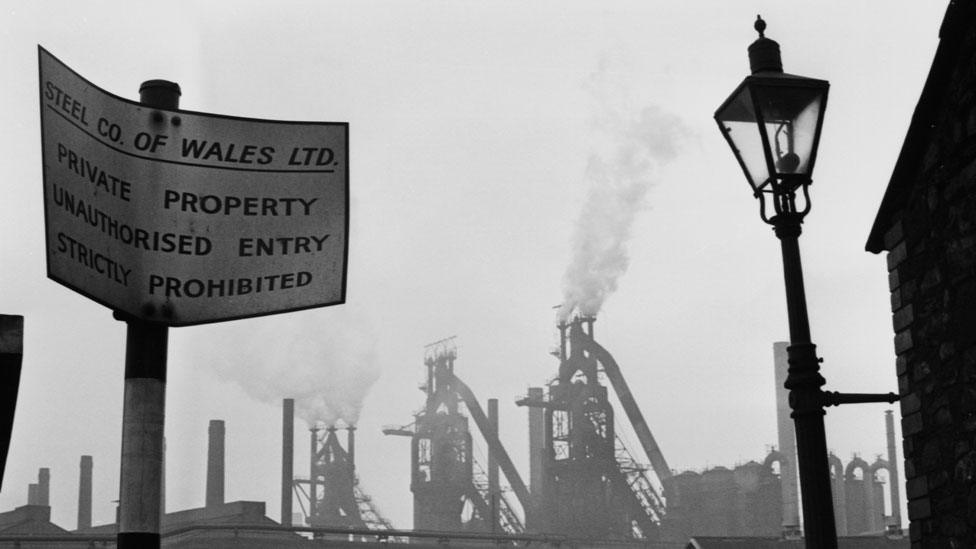Tata: Turbulent year for UK steel industry
- Published
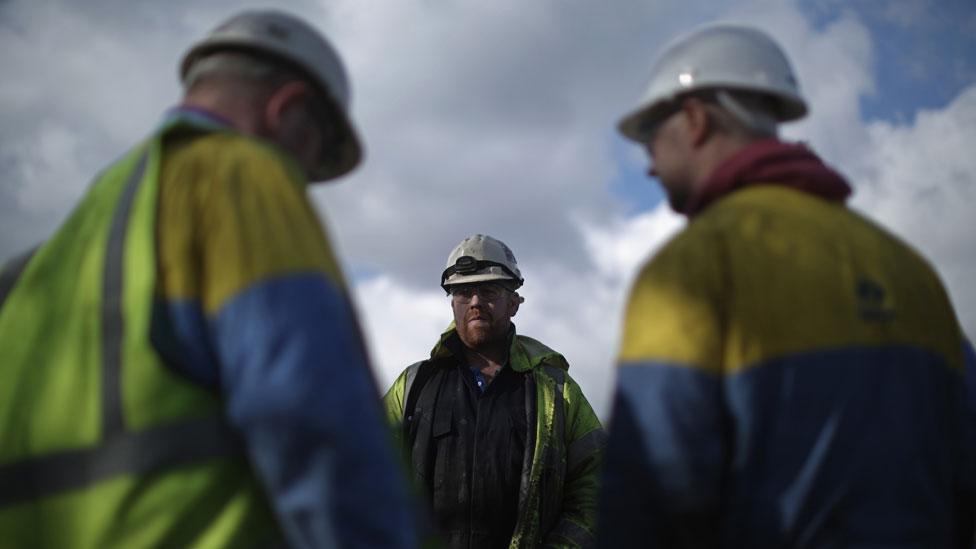
A ballot of steel workers to decide on whether to accept Tata's less generous pension scheme is expected to begin on 30 January.
It comes after a turbulent year for the 6,300 staff employed by the firm in Wales.
"Save our steel" became a familiar chant as workers rallied the public to back their campaign to protect their livelihoods and the thousands of other jobs that depend on Tata's Welsh businesses.
Tata's steelworks has dominated the Port Talbot skyline for decades and this year it has also dominated the news headlines.

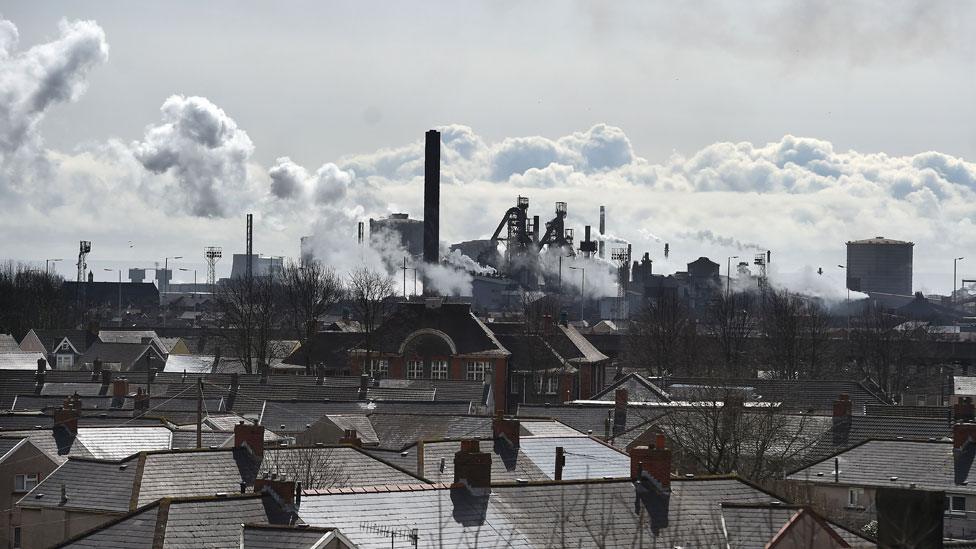
Port Talbot, which still employs more than 4,000 workers
2016: A TROUBLED YEAR FOR STEEL
January: Tata Steel confirms plans to cut 1,050 jobs in the UK, including 750 at Port Talbot, the UK's biggest steelworks, blaming a fall in prices and cheap Chinese imports.
February: Thousands of steelworkers protest in Brussels and call for EU support. The Community union is worried about changes at the top in Tata Steel.
March: Tata announces its plans to sell its UK business, with ministers saying they are looking at "all the options" to support Port Talbot plant. The assembly is recalled. Unions are concerned Port Talbot could be mothballed.
April: Prime Minister David Cameron on the election trail visits Port Talbot. The UK government says it would consider a stake in any rescue plan.
Tata Steel's UK boss leads management buy-out team Excalibur while steel and commodities tycoon Sanjeev Gupta's Liberty House group is another contender .
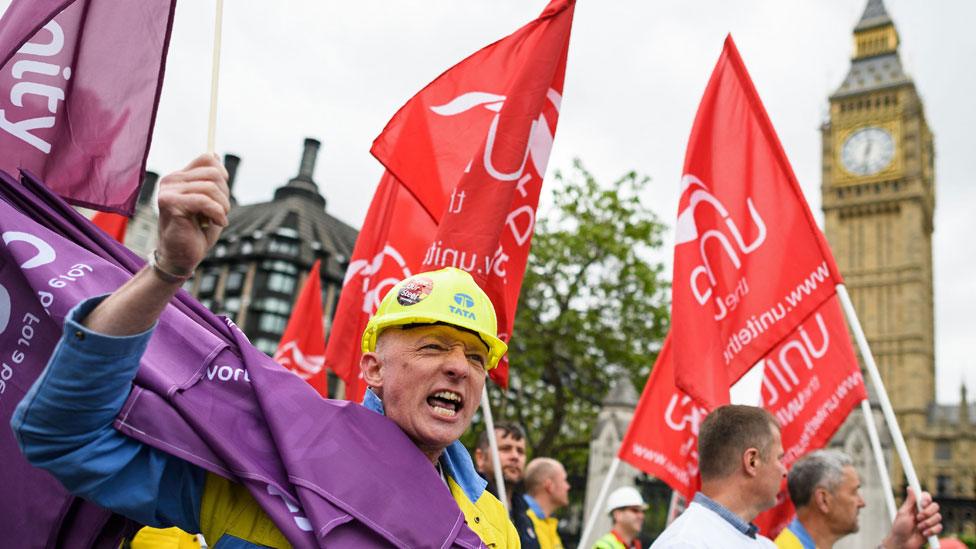
Steel workers protest in London in May
May: Liberty House and Excalibur both submit interest in buying Tata's UK operations .
June: With seven bidders lined up and still no announcement, unions express "serious concerns" about the sale process and the future.
July: Tata puts sale on hold and it looks at European tie-ups including possible merger with German rival Thyssenkrupp.
August: Despite uncertainty elsewhere, Shotton steelworks, which employs 700 workers, gets a £7m investment boost.
September: Tata's former plant in Motherwell re-opens while talks continue about the sale of Tata plants at Rotherham, Stocksbridge and Hartlepool to Liberty.
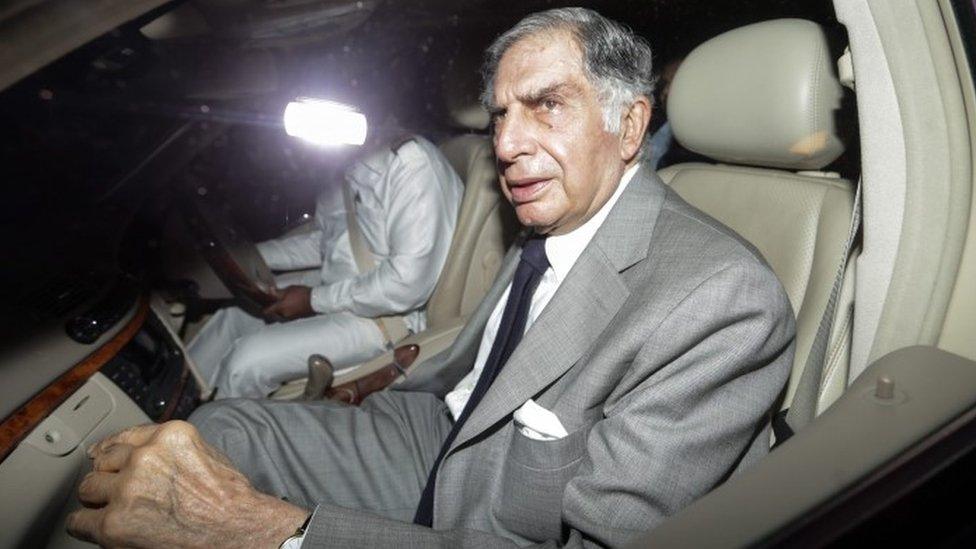
Ratan Tata returned unexpectedly as chairman of Tata in October
October: Despite improvements, the company said Tata's operations were not "out of the woods yet".
November: Prime Minister Theresa May's visit to India which does not include a meeting with Tata is criticised back at home. In the background, there is a battle in the boardroom in Mumbai.
7 December: Tata unveils a deal including a five-year commitment to Port Talbot's blast furnaces, a 10-year £1bn investment plan but also changes to the pensions scheme.
21 December: The pensions part of the deal is proving harder to sell to staff, BBC Wales understands.

There was a perfect storm at the start of 2016: the viability of the giant Port Talbot itself - said to be losing a million pounds a day; falling steel prices; high energy costs and cheap Chinese imports.
The response started with 1,000 UK job losses and a survival plan, drawn up in south Wales. Tata and the unions demanded the EU take action by putting tariffs on Chinese steel, which they said was being dumped on Europe at prices below the cost of making it.
They also wanted UK government action on energy costs. Port Talbot steelworks alone uses as much electricity as the whole of the city of Swansea a few miles along the coast.
But just as important as external economic forces, the internal politics of Tata were playing out.
Decisions about the plant's future were being made behind closed doors 4,500 miles away at the company's headquarters in Mumbai.
The board shocked everyone by rejecting the survival plan and putting its entire UK operation up for sale.
The Welsh Government pledged support including £60m but it was clear that due to the scale of the industry if taxpayer support was needed it could take the financial firepower of Westminster to make the sale a success.
UK ministers were prompted into action, committing the government to taking a stake of up to 25% with any interested buyer.
Despite initial concerns that nobody would be willing to take over the whole business including the loss-making Port Talbot, seven potential buyers did come forward.

Production continued and things started to turn around as the plan rejected by the Tata board was put in place and showed signs of success.
Steel prices rose, the EU put tariffs on some cheap imports and the UK government scheme to help with energy intensive industries with costs came through.
Abruptly, Tata halted the sale of its Welsh operations saying it would pursue a merger with the German firm, Thyssenkrupp.
A boardroom battle at the top of Tata in India saw the man who was trying to sell Port Talbot, then chairman, Cyrus Mistry, replaced by the man who had bought it in the first place, former chairman, Ratan Tata.
In a deal with the unions, the company set out its new plan earlier this month.
It involves a £1bn investment in Port Talbot over 10 years if savings can be made in the business and a commitment to keep the two blast furnaces for five years.
But the price is high for workers.
It is tied to them voting to move from the final salary pension to a much less generous one.
It is by no means a done deal though.

2016: THE WORKERS AND COMMUNITY
Mark Turner, a steelworker and Unite union official at Port Talbot talks through a "rollercoaster" 2016
David Edwards, a steelworker for 11 years at Port Talbot, said it had been a difficult and frustrating year around the sale of the company and the mood was still depressed.
"It's been a very worrying time and it continues to be worrying," he said.
"When we were first put up for sale - there seemed to be a few potential buyers with the good of the company and the workers at heart.
"But that seems to have been shut down and we don't really know if there's anyone still out there and if we're going to be put up for sale, no-one knows the outcome to.
"I don't feel any more secure now than I did back in January."
Recalling the day it was put up for sale, Aberavon councillor and retired steelworker Tony Taylor said he was "flabbergasted" but after a difficult year, the deal on offer at least offered investment.
"We need this plant to be running over the next 20 or 30 years if possible," he said. "There's still uncertainty but there's more optimism, guarded optimism."

After a year of decisions being made about them elsewhere, the decision on pensions is now firmly in the hands of Tata's Welsh workforce.
They will have a lot to think about before they receive their ballot papers at the end of January.
- Published21 December 2016
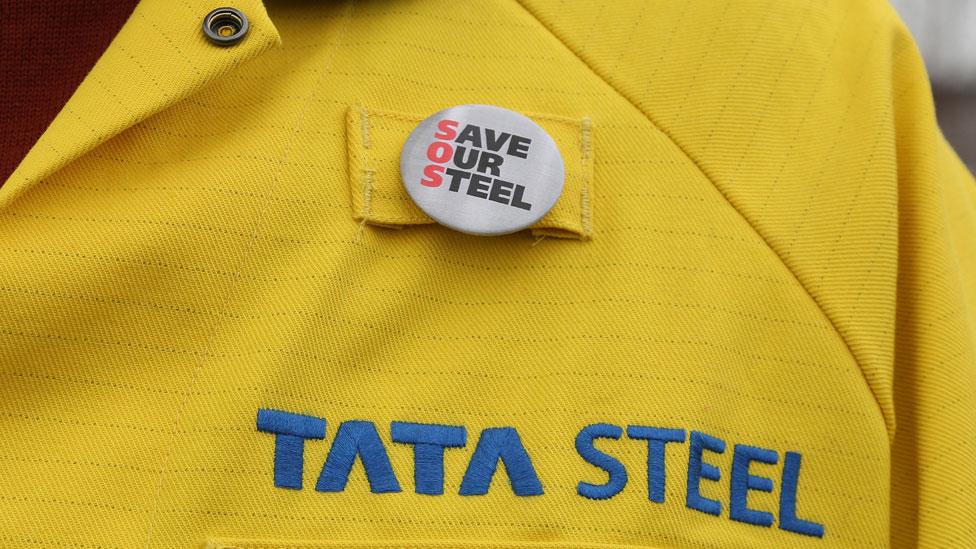
- Published7 December 2016
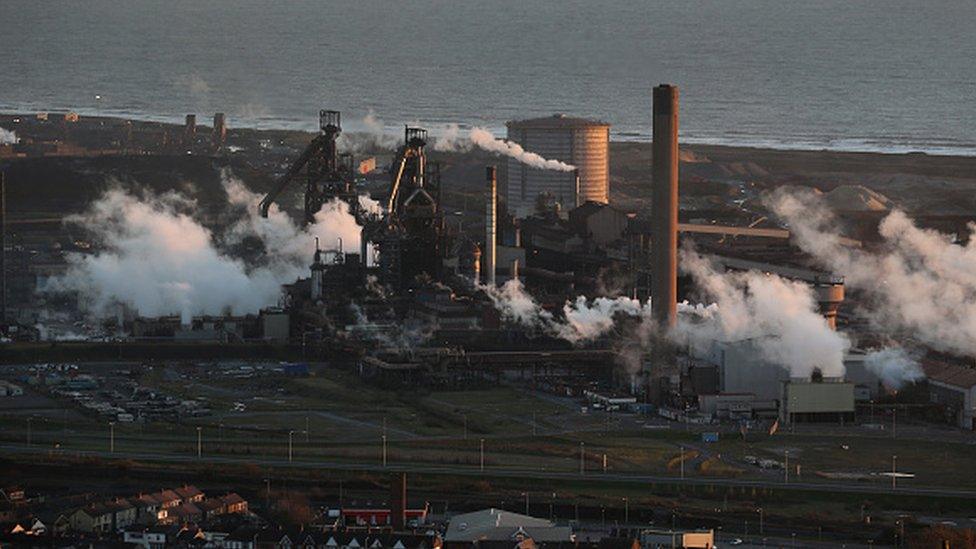
- Published7 December 2016
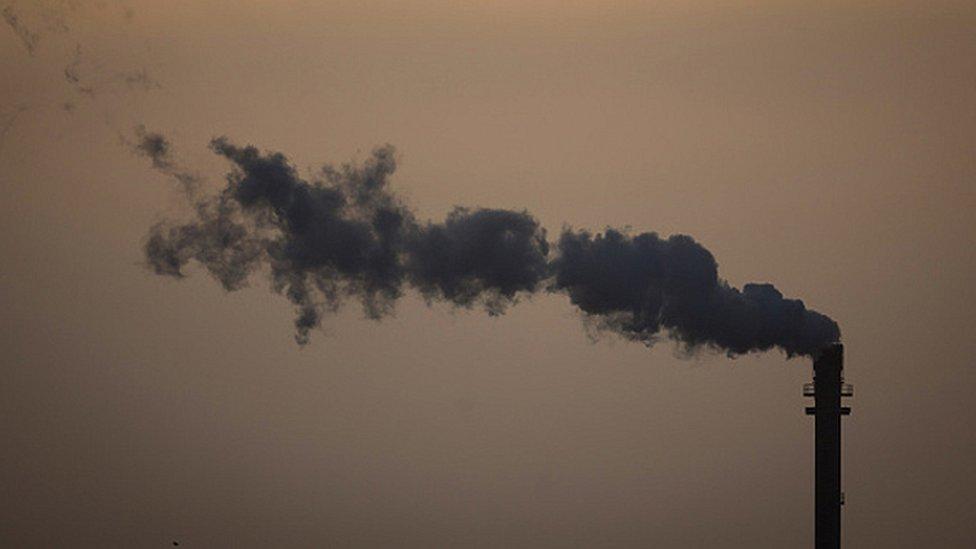
- Published7 December 2016
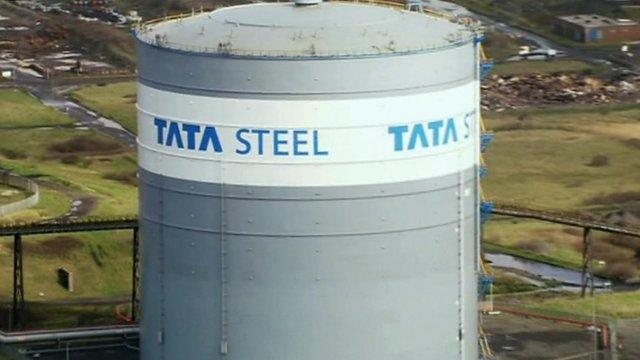
- Published18 January 2016
